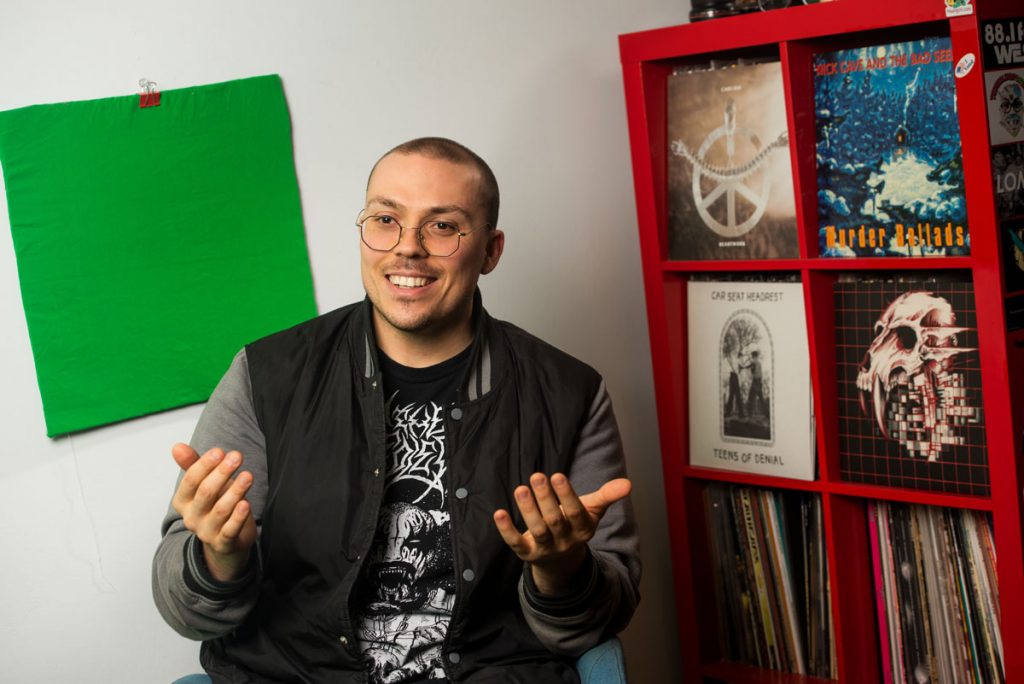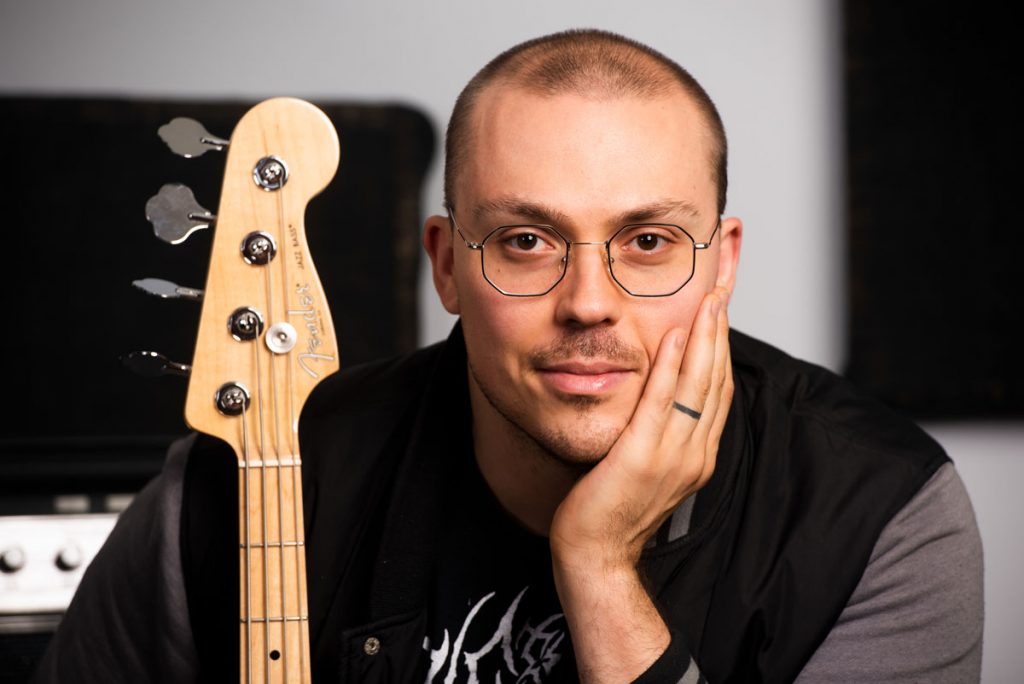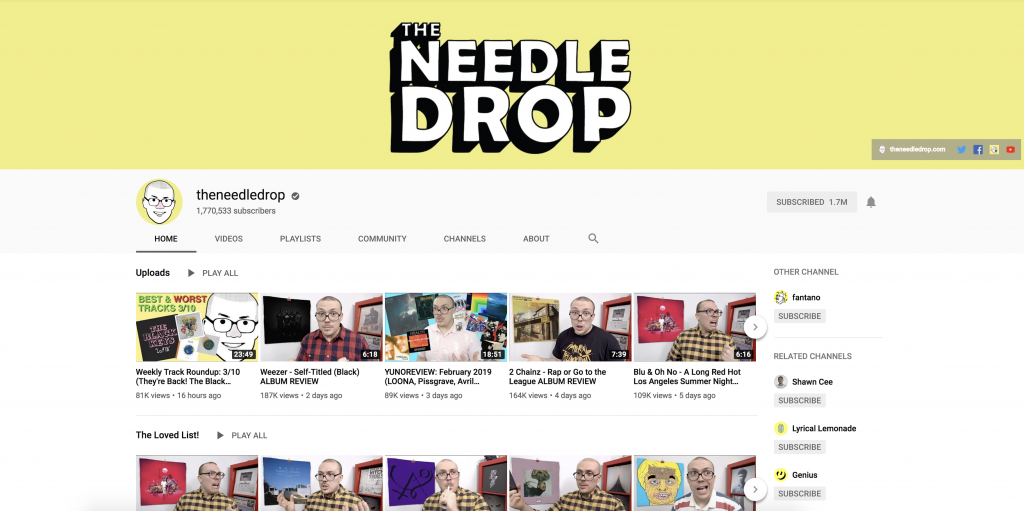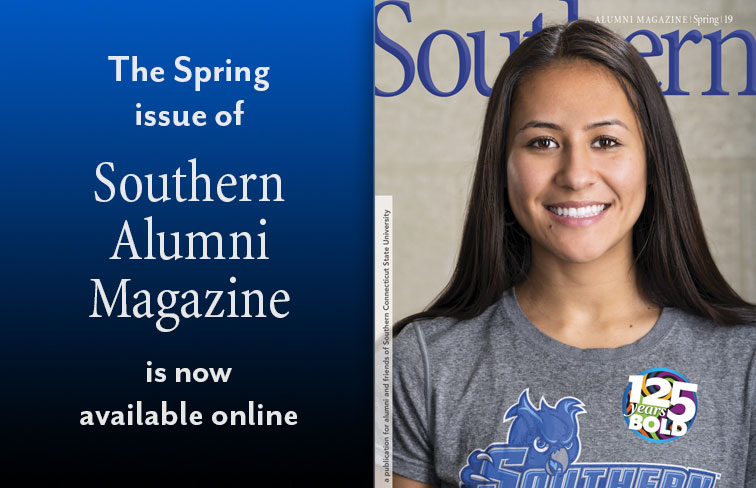Anthony Fantano, ’08, describes himself as the “internet’s busiest music nerd.” Spin — the legendary magazine turned webzine run by Billboard-Hollywood Reporter — offers a different perspective, dubbing him “today’s most successful music critic.”
It’s an apt description. Fantano began posting music reviews on his YouTube channel The Needle Drop in 2009. Two years later, he walked away from MTV’s second annual O Music Awards with the “Beyond the Blog” award. Today, Fantano is a celebrity in his own right, connecting with fans across multiple social media platforms, including YouTube/theneedledrop (more than 1.75 million subscribers), Twitter (473K-plus followers), and Facebook (229K-plus).
Fantano says his college years — specifically time spent at WSIN, the college radio station — expanded his focus on music and media. He majored in liberal studies [now interdisciplinary studies], with concentrations in journalism, political science, and communication. During an internship at Connecticut Public Radio in Hartford, he proposed and ran The Needle Drop as a podcast — setting the stage for what would eventually evolve into his wildly popular vlog (video log or blog).
Over the course of two interviews, he talked with Gregory Gagliardi, ’18, and Southern Alumni Magazine. In the following excerpts, he shares thoughts on Southern, success, and the meaning behind the flannel shirts he wears in his reviews. (Yellow signifies a great album; red, not so much.)
How did you come to attend Southern?
Coming in, I was thinking radio, radio, radio. So I was looking for a college with a radio station — a place that was close to me that was affordable. Southern seemed like the best of all of those worlds.
How did Southern help prepare you to launch the Needle Drop?
[Southern] provided places like the radio station and the school paper — training grounds to learn the ropes of journalism and broadcasting. In fact, I was there [at the station] even before school started. It was priority number one because that was my career goal.
How active were you with the radio station, WSIN?
Freshman year I came in and did a show. I hung out all the time, put in a lot of effort, and made a lot of friends. They saw I had a passion and interest. . . . That put me on the map for a lot of people and allowed me to go up the ranks at the radio station pretty quickly. I was the general manager for two years; the music director for a year before that.

And the show?
I had a show pretty much the entire time — except for a span when I was also the general manager and thought it was too much to juggle. But toward my final year at Southern I brought it back. I had gotten control of juggling work, school, the radio station . . .
So you were balancing everything well?
At the time, I didn’t feel like I was doing it very well. I was general manager and there was a lot of turbulence. The new student center had just opened and every other club — every other everything — had moved [to the new building]. We were in the old student center for over a year, if I remember correctly. We were literally the only people in the building. Sometimes in the winter, the heat was not as high as it should have been. . . .
It sounds very rebel student radio.
It seems very cool in retrospect, but everyone in the Radio Club was miserable about it at the time. [laughs]
The profile of you in Spin in 2016 mentioned that a professor helped you get an internship with Connecticut Public Radio.
It was the [WSIN] adviser, Jerry Dunklee, [professor of journalism]. By the time I finished college, my game plan was to go into radio as a political reporter, which is why I ended up at WNPR in Hartford.
What was the internship like?
It was a really good opportunity to learn more about the technical aspects of the business, since the amount of production they did was far greater than at the [university] station. I also got to see everything I’d learned in my “ethics in journalism” classes applied, sort of rubber to the road — in terms of what they were reporting and how they were reporting. The lengths they went to get an interview or clarify information. . . . Those are all things I still draw on today.

When I was younger, my aspirations were either in radio or in voice acting. [laughs] As my passion for music grew, my efforts started pointing elsewhere. The whole YouTube thing never could have been predicted. [YouTube formed in 2005.] . . . But as the platform grew, certain aspects like the partner program [which lets creators monetize their content] began to gain steam, and there were YouTubers out there who were actually making a career out of what they were doing. [For me,] it seemed like a last-ditch effort. Because the podcasts and the blog were not really panning out monetarily, so I figured YouTube might be my last hope.
But I had no way of foreseeing that I’d be doing music reviews on YouTube — and not just because of the YouTube factor. I didn’t grow up reading reviews. I wasn’t comfortable considering myself a reviewer or critic when I was doing the podcast initially. Those are two aspects of my career I stumbled into through experimentation.
Was there a specific point when you felt like you’d made it?
I was able to take The Needle Drop full time in 2012. I was making just enough money to move into an apartment with my girlfriend, so it was a ‘real’ job.
Beyond that, what says to me, ‘you’ve made it,’ is the way the audience perceives what you do and how they interact — especially in the internet age. Are you familiar with the website Reddit? [Founded in 2005, Reddit is a huge collection of online forums devoted to different topics.] . . . There is a [sub]reddit with 30,000 people who post about me. . . . [It was up to 44,200 at press time.] They post the most insane stuff — not bad — but insane in their level of devotion to every word that comes out of my mouth. To me, this says that this is a cultural phenomenon — not on the level of Drake or anything like that — but it has certainly brought me to a point where I can sustain myself and my loved ones. That means something to me.

That must be really satisfying.
Back when I had to struggle — not only to make ends meet but also to see the effect of what I was doing — I’d think, ‘I’m going to have a panic attack or two this month about what I am doing with my life.’ That doesn’t happen these days, mostly because I am too busy.
Were you always interested in music?
Absolutely. Collecting cassette tapes with my boom box. I loved a lot of radio music: pop and rock, hip-hop, whatever was popular at the time. When I got into high school, it was more alternative and punk. College helped expand my focus. We’re talking about the growth of P2P [peer to peer] file-sharing services like Napster, which are obviously obsolete now that we have music streaming. But at the time it was a music library, since I didn’t have all the money in the world to buy every other CD or album.
The [Southern] radio station and the university also helped. It wasn’t only the CDs and albums flowing into the station, but other resources like [Southern’s Buley] library. . . . I’d take out 15 or 20 CDs at a time. And during my 45-minute commute to school I’d listened to all the jazz CDs I’d illegally burned from the library.
You’ve achieved mainstream success with The Needle Drop. Has increased exposure brought any problems?
Sure, but nothing worth complaining about. All jobs come with their pros and cons. The only downside is the occasional, unintended creepiness of random people who might say something a little weird online. If you have millions of people watching you every month there are going to be one or two who don’t have any boundaries. The upsides far outweigh that. Most people have been really cool and respectful.
The internet connection must take things to a different level.
Yes. But I don’t blame anyone. There is a very friendly conversational tone to my videos. And a lot of people have been watching me for a long time. When I do speaking engagements, they’ll tell me they’ve been watching me since [they were in] sixth grade. That’s almost like being someone’s weird internet dad or something. At that point, you’ve become part of this person’s life — and their emotional and mental ecosystem.
Looking back at your time at The Needle Drop, what are you most proud of?
I have my nose to the grindstone so often that it’s hard to take a breather and think back on all the crazy things that have happened over the past 10 years. While an interview with Mick Jagger and a laundry list of endorsements from a variety of artists look good on paper, the best thing about it is just being a growing part of a greater conversation about music.
Take us inside the review writing process – from the onset to the final video.
The process is pretty much like watching paint dry: listening, re-listening, note taking, researching, drafting, re-drafting, recording, editing. It’s all very quiet, patient, introspective.
What are your thoughts on criticism directed at your reviews?
Ah, the criticism is what it is. It would be ridiculous for me to state my opinions on new records so openly and not expect to get criticism in return. It comes with the territory. If you go into this line of work expecting to have every one of your opinions praised, you’re in it for the wrong reasons. It’s more about stirring the pot, getting people thinking, sparking discussion, planting seeds for the listening audience to mull over. It’s not about being liked or being right. Sure, it’s nice when those things happen. But if that’s all you’re looking to achieve, you’re failing in your role as a critic.
Which is?
One of the most important things you can give your audience when talking about content you’re passionate about — is to give them pause. A reason to think about what they are listening to or consuming. To get them to think about why they enjoy it or why they don’t.
Is there anything new on the agenda for The Needle Drop?
I have a second YouTube channel [YouTube/fantano launched in 2017] where I talk about music news. . . . I am grouping the videos together to a podcast series so you can listen from there. A goal is to find ways to creatively repackage content so people can consume it in different ways.
There is someone I’ve been talking to about [the possibility of] a record label. I am considering it, but there are potential major journalistic ethics issues there. I couldn’t review people on the label. . . . So it creates a weird conundrum that I’m not sure I’m ready to dive into. Someone else approached me recently about helping put together a charity compilation of artists who I’ve reviewed over the years — and money would go to children’s cancer research. There’s a guy I’ve been talking to — trying to work out how to expand merchandise.
I expected you to be wearing a flannel, like in the posts.
The flannel thing is funny. When I first started, they were in regular rotation in my wardrobe, which is why I was wearing them in the first place. Now the flannel has become a signifier. When people see I’m wearing a red flannel in the thumbnail of the video, they know it’s a negative video. When they see a yellow flannel, they know it’s a positive review. I rarely wear one casually now. It’s like wearing my work clothes.
Speaking of work clothes, is doing The Needle Drop still fun?
Yes. It comes to those times when it’s 9 to 5 like anything else — but it’s better than 9 to 5 in an office. Even though it’s a lot of work. A lot of extra effort. One thing this generation doesn’t really appreciate is the quality of the workplace — that they are always connected with their job. As a result, they are never not working. If I am going to be in that position, I’d rather be doing it for me.
See other stories from the online issue of Southern Alumni Magazine.



